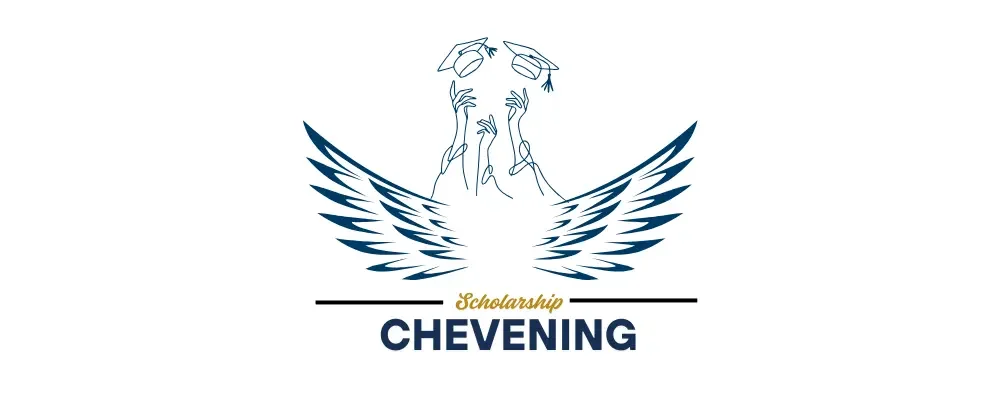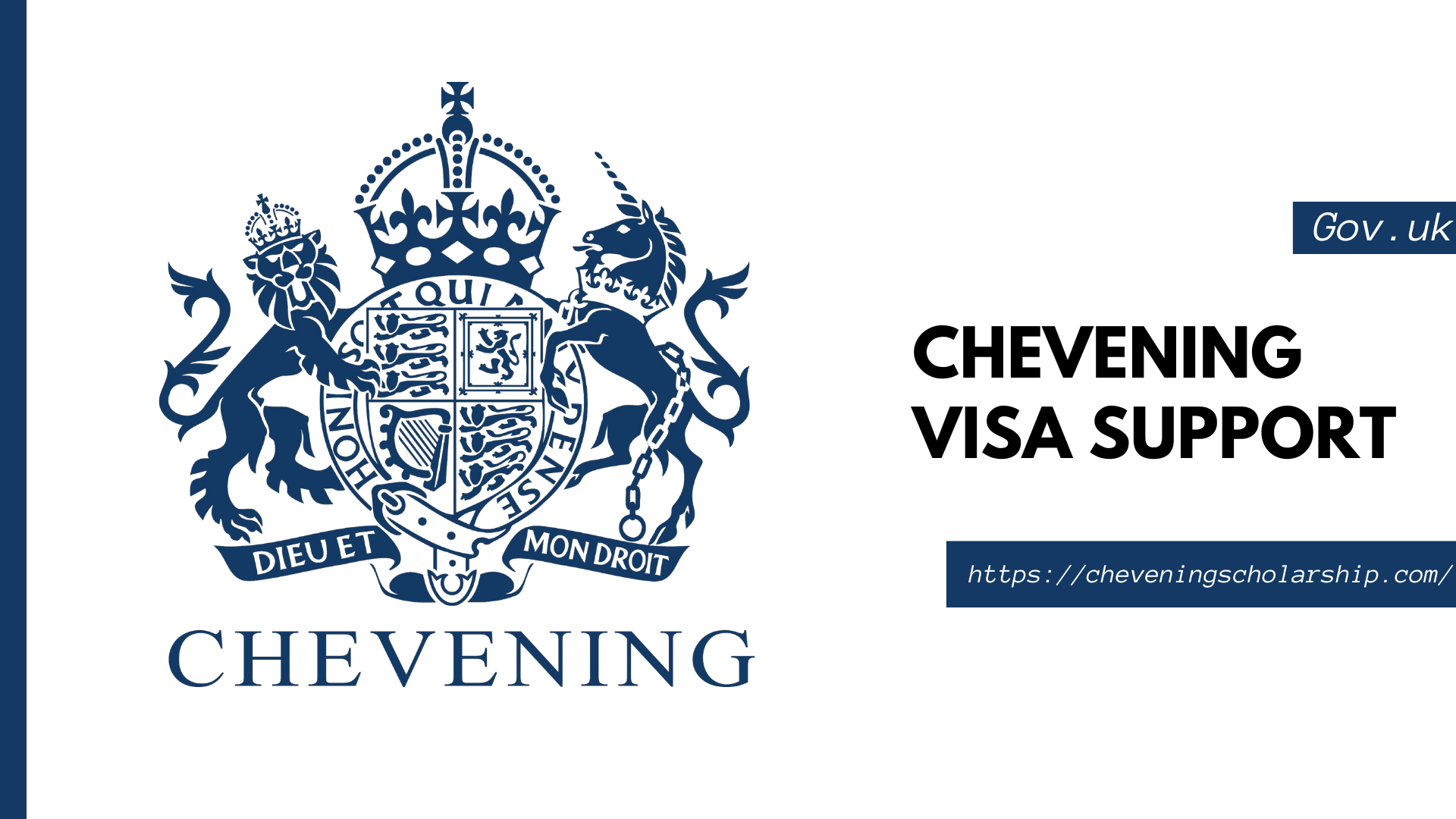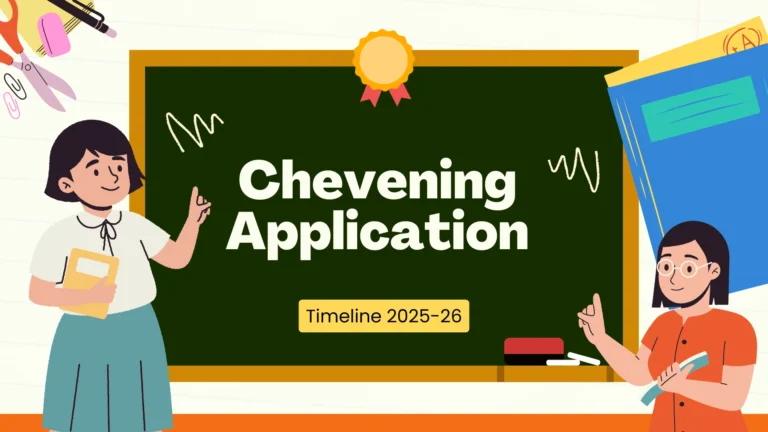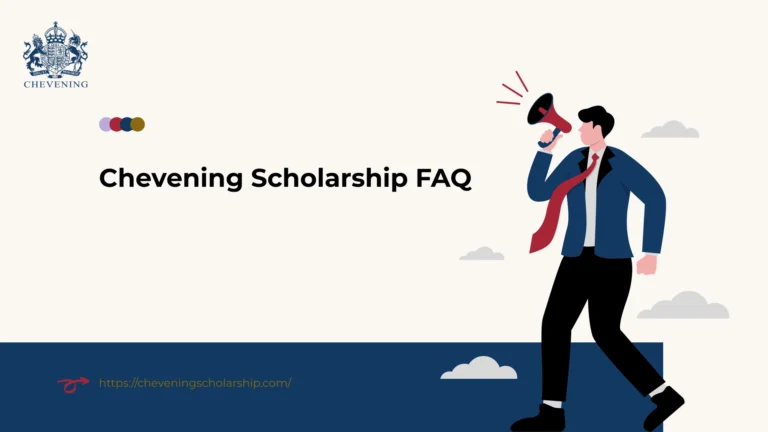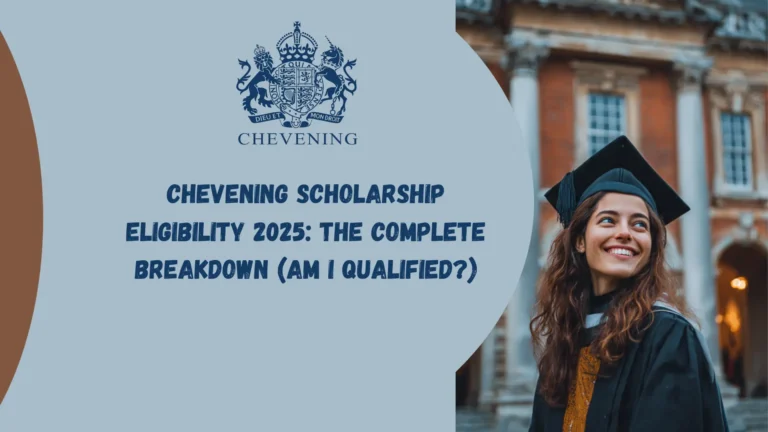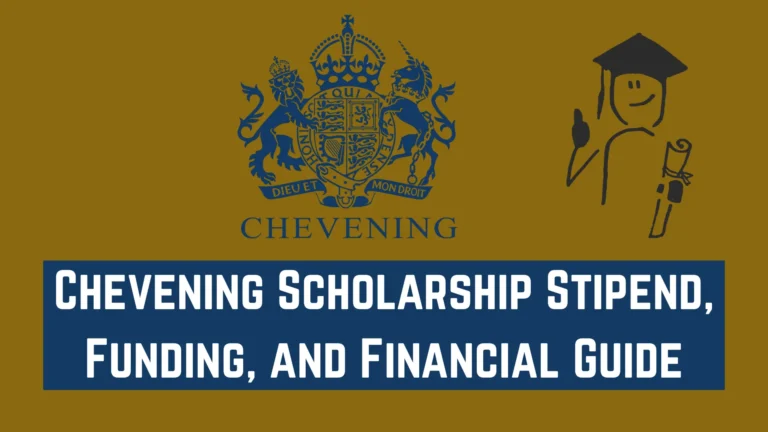Chevening Visa Support: Everything You Need to Know About Getting Your UK Student Visa
You’ve done it. You’ve survived the grueling Chevening application process, nailed the interview, and that glorious email arrived: “Congratulations, you’ve been awarded a Chevening Scholarship.”
Pop the champagne, call your parents, update your LinkedIn. You deserve it.
But then reality hits. You need a UK visa. And suddenly that celebration feels premature because visa applications are notorious for being stressful, complicated, and occasionally nightmarish. I’ve seen Chevening winners spiral into anxiety wondering: What if my visa gets rejected? What if there’s a delay? What documents do I actually need? Will I mess this up after getting this far?
Here’s what you need to understand: Chevening visa support is comprehensive, and your visa process—while not exactly fun—is significantly easier than for most international students. Chevening doesn’t just hand you money and wish you luck. They actively support you through the UK visa application process with documentation, guidance, and resources that dramatically improve your chances of success.
Let me walk you through exactly what Chevening visa support looks like, how to navigate the UK student visa application, and how to avoid the common pitfalls that trip up even successful scholarship recipients.
Chevening Scholarships UK: The Ultimate Guide to Britain’s Most Coveted Award
What Is Chevening Visa Support?
Let’s start with what you’re actually getting when we talk about “Chevening visa support.”
Unlike many scholarships that end at the financial award, Chevening provides structured support throughout your visa application journey. This isn’t hand-holding through every step—you’re expected to be a capable professional—but it’s substantial assistance that makes the process manageable.
Chevening visa support includes:
Official sponsorship documentation: Chevening provides formal letters and documents proving your scholarship status, which carry significant weight with UK immigration authorities
Financial proof: Documentation showing you have adequate funding for your UK stay (crucial for visa approval)
Guidance materials: Comprehensive guides on the UK student visa application process specifically for Chevening scholars
Access to support teams: Both at the Chevening Secretariat in London and through British embassies/high commissions in your country
CAS sponsor support: Your UK university issues your Confirmation of Acceptance for Studies (CAS), but Chevening coordinates with universities to ensure smooth processing
Pre-departure briefings: Information sessions covering visa requirements and UK arrival procedures
Emergency support: If things go wrong (delays, rejections, complications), Chevening can intervene and provide assistance
Understanding the UK Student Visa for Chevening Scholars
Before diving into Chevening-specific support, let’s clarify what visa you’re actually applying for.
The Student Visa (Formerly Tier 4)
Chevening scholars apply for a Student visa (previously called Tier 4 General Student visa). This is the standard visa for international students pursuing higher education in the UK.
Key characteristics:
- Allows you to study at a UK higher education institution
- Typically valid for the duration of your course plus a few months
- Permits part-time work (up to 20 hours per week during term time)
- Can be extended if needed for additional study
- Requires proof of financial support and genuine student intent
What makes Chevening applications different: Unlike most international students who must prove they personally have funds to support themselves, Chevening scholars benefit from official government sponsorship, which significantly strengthens their application.
Chevening Scholarship Financial Aid: Your Complete Money Guide
The Visa Application Process Overview
Here’s the big picture of what you’ll go through:
- Receive your Chevening offer (June-July)
- Accept your university offer and receive CAS document (May-August)
- Prepare your visa documents (July-September)
- Complete online visa application (July-September)
- Pay visa fees and Immigration Health Surcharge (at application)
- Attend biometric appointment (within weeks of applying)
- Wait for visa decision (typically 3-8 weeks)
- Receive visa and travel to UK (before course starts)
The entire Chevening visa application timeline from receiving your scholarship offer to arriving in the UK typically spans 2-3 months, though timing varies by country.
Chevening Visa Requirements: What You Actually Need
Let’s break down the specific Chevening visa requirements document by document, so you know exactly what you’re dealing with.
Essential Documents for Chevening Visa Application
1. Valid Passport
- Must be valid for the entire duration of your stay
- Should have at least one blank page for your visa
- If your passport expires during your studies, renew it before applying
2. CAS (Confirmation of Acceptance for Studies)
- Issued by your UK university once you’ve accepted your offer
- 14-digit reference number essential for your visa application
- Contains details of your course, start date, and fees
- Chevening coordinates with universities to ensure timely CAS issuance
3. Chevening Award Letter
- Official letter from Chevening confirming your scholarship
- Proves financial sponsorship (critical for visa approval)
- Demonstrates you have UK government backing
- This document carries enormous weight with visa officers
4. Financial Documents
- Technically, Chevening’s sponsorship covers financial requirements
- However, some visa centers may still request proof
- Bank statements showing maintenance funds (if required)
- Sponsorship letter from Chevening detailing financial coverage
5. Academic Qualifications
- Original degree certificates or certified copies
- Transcripts showing your academic history
- English language test results (IELTS, TOEFL, etc.)
- Professional qualifications relevant to your course
6. Tuberculosis Test Results
- Required if you’re from a country on UK’s TB testing list
- Must be from an approved clinic
- Test certificate valid for 6 months
- Check gov.uk/tb-test-visa to see if you need this
7. Passport-sized Photographs
- Usually uploaded digitally during online application
- Must meet specific UK visa photo requirements
- Color photo, plain background, specific dimensions
8. Previous UK Travel History (if applicable)
- Previous UK visas
- Entry/exit stamps showing compliance with visa conditions
- Proof of timely departures from UK
| Document | Status | Notes |
|---|---|---|
| Valid Passport | Required | Valid for full study duration |
| CAS Number | Required | From UK university |
| Chevening Award Letter | Required | Official sponsorship proof |
| TB Test (if applicable) | Required | Country-specific |
| Academic Certificates | Required | Originals or certified copies |
| English Test Results | Required | IELTS/TOEFL/equivalent |
| Financial Documents | Sometimes | Despite Chevening sponsorship |
| Passport Photos | Required | Digital upload |
Chevening Visa Fees: What’s Covered and What’s Not
Money matters, so let’s be crystal clear about Chevening visa financial support.
What Chevening Covers
Immigration Health Surcharge (IHS):
- Mandatory fee for accessing NHS during your UK stay
- Typically £470 per year of visa validity
- For a one-year master’s program: approximately £624
- Chevening reimburses this cost
UK Visa Application Fee:
- Standard student visa fee: £363-£490 (varies slightly by country)
- Chevening covers this in your stipend or reimburses it
TB Test Fee:
- If required, typically £65-120 depending on country
- Chevening reimburses this expense
Travel to UK:
- Economy class airfare from home country to UK
- Included in Chevening package
What You Pay Initially (But Get Reimbursed)
Here’s where it gets slightly complicated. You typically pay these fees upfront during your visa application, then Chevening reimburses you once you arrive in the UK and submit receipts.
The practical flow:
- You pay visa fee and IHS when submitting application
- You save all receipts and confirmation emails
- You arrive in UK and register with Chevening
- You submit reimbursement claim with receipts
- Chevening processes reimbursement to your bank account
Important: Keep every receipt. Photograph them, scan them, email them to yourself. Without proper documentation, reimbursement becomes complicated.
Inside Chevening Partnerships: How Global Organizations Are Shaping Tomorrow’s Leaders
What Chevening Doesn’t Cover
Biometric appointment premium services:
- Priority appointments or premium lounges
- These are optional upgrades, not necessary
Travel costs for visa appointments:
- Getting to and from your biometric appointment
- Accommodation if the visa center is far from your home
Document translation fees:
- If you need certified translations of documents
- Professional translation services can be expensive
Priority or super-priority visa processing:
- Optional services to speed up visa decisions
- Typically unnecessary for Chevening scholars
Rejected application fees:
- If your visa is rejected, you lose those fees
- Reapplication costs are also not covered by Chevening
The CAS Document: Your Golden Ticket
Let’s talk about the single most important document for your Chevening visa application: the Confirmation of Acceptance for Studies (CAS).
What Is a CAS?
Think of the CAS as your visa’s foundation. It’s a unique 14-digit reference number issued by your UK university that contains all the essential information about your course and confirms the university has accepted you as a student.
The CAS includes:
- Your personal details
- Course details (name, level, duration, start date)
- Tuition fee amount
- Confirmation you meet academic requirements
- Confirmation you meet English language requirements
- Your Chevening scholarship information
How to Get Your CAS as a Chevening Scholar
Standard process:
- Accept your university offer formally through their admissions system
- Provide required documents to the university (degree certificates, transcripts)
- Confirm your Chevening sponsorship with the university
- University verifies everything with Chevening Secretariat
- CAS is issued electronically to your email
- You receive your CAS number (usually within 1-2 weeks of providing all documents)
Chevening coordination: Your university’s admissions team already knows about Chevening. The scholarship has partnerships with universities, and they’re familiar with the process. Still, proactive communication helps:
- Email your university’s international office confirming your Chevening award
- Provide your Chevening reference number
- Ask for a timeline for CAS issuance
- Follow up if you don’t receive it within expected timeframe
Common CAS Problems and Solutions
University delays issuing CAS:
- Contact Chevening support team—they can push universities
- Email your university’s international student office
- British Council in your country may be able to intervene
CAS contains errors:
- Contact university immediately to request correction
- Errors must be fixed before visa application
- Can delay your application significantly
CAS expires before you apply:
- CAS validity periods are limited
- University can reissue if it expires
- Plan your visa application timing carefully
Navigating the UK Visa Application Portal for Chevening
Now comes the actual application. The UK visa system uses an online portal that can be confusing, so let’s walk through it systematically.
Step 1: Creating Your Account
Visit: visa.gov.uk (official UK visa application website)
What you’ll need:
- Your email address (use one you check regularly)
- A password you’ll remember
- Your passport handy for entering details
Pro tip: Use the same email address for all visa-related communications. Create a dedicated folder in your email for visa correspondence.
Step 2: Selecting the Correct Visa Type
This is crucial. Navigate to:
- “Student” visa category
- “Tier 4 (General) Student Visa” or “Student Visa” (naming has changed recently)
- Confirm you’re applying for study at a UK university
Don’t accidentally apply for:
- Short-term study visa (wrong type)
- Child student visa (unless applicable)
- Other visa categories
Step 3: Completing the Application Form
The online form is lengthy—typically 50+ questions across multiple sections. Save frequently as you go.
Key sections:
Personal Information:
- Name exactly as in passport
- Date and place of birth
- Nationality and passport details
- Contact information
Travel History:
- Previous UK visits (if any)
- Other international travel (last 10 years)
- Previous visa refusals anywhere (be honest—they check)
CAS Details:
- Your 14-digit CAS reference number
- University name and course details
- Course start and end dates
Financial Information:
- Select “Official Financial Sponsor”
- Enter Chevening scholarship details
- Upload Chevening award letter
English Language:
- Confirm you meet English requirements
- Provide test results or exemption details
Maintenance (Financial Support):
- Indicate you have official financial sponsor
- Chevening’s sponsorship means you don’t need to show personal funds
How to Use the Chevening Resource Hub to Maximize Your Scholarship Application
Step 4: Uploading Supporting Documents
The portal allows document uploads—use this efficiently:
Documents to upload:
- Chevening award letter (PDF)
- Academic certificates and transcripts
- English language test results
- Passport bio-data page
- TB test certificate (if required)
- Previous UK visa pages (if applicable)
Upload tips:
- All documents should be PDF format
- File size limits apply (usually 5MB per file)
- Label files clearly (“Chevening_Award_Letter.pdf”)
- Ensure documents are legible and complete
Step 5: Paying Fees and Booking Biometric Appointment
Once you complete the form:
- Pay the visa application fee (£363-490)
- Pay the Immigration Health Surcharge (approximately £624)
- Book your biometric appointment at a visa application center
Payment methods accepted:
- Credit/debit cards (most common)
- Some countries allow other payment methods
- Payment is immediate and non-refundable
Booking biometrics:
- Choose a convenient visa application center
- Select date and time for appointment
- You’ll receive confirmation email
- Print and bring this confirmation to your appointment
The Biometric Appointment: What to Expect
Your biometric appointment is when you physically submit your passport and provide fingerprints and photograph. For many, this is the most stressful part of the Chevening visa process.
What Happens at the Appointment
Arrival and check-in:
- Arrive 15 minutes early
- Bring all required documents
- Check in at reception
- Security screening (no phones allowed inside)
Document submission:
- Submit your passport (you won’t get it back until visa is decided)
- Hand over any physical supporting documents
- Staff may ask clarifying questions
Biometric capture:
- Digital fingerprint scan (all ten fingers)
- Digital photograph taken
- Takes about 5-10 minutes
- Painless and straightforward
Receipt and departure:
- Receive receipt confirming biometric capture
- Given information on tracking application status
- Timeline estimate for visa decision
- You leave without your passport
What to Bring to Your Biometric Appointment
Essential documents: ☐ Passport (will be retained) ☐ Biometric appointment confirmation letter ☐ Application reference number ☐ Payment receipts ☐ Supporting documents (if not uploaded online)
Prohibited items: ✗ Mobile phones (must be left outside or checked) ✗ Large bags ✗ Electronic devices ✗ Food and drinks
Common Biometric Appointment Issues
Forgot your appointment:
- Contact the visa center immediately
- You may need to rebook (can delay your application)
- Brings anxiety and stress you don’t need
Documents aren’t accepted:
- Usually due to incorrect format or missing information
- Can sometimes be rectified, but causes delays
- Triple-check everything before your appointment
Fingerprints don’t scan properly:
- Can happen due to worn fingerprints or skin conditions
- Staff will work with you to get clear scans
- Rarely a dealbreaker
Chevening Visa Processing Time: Managing Expectations
After your biometric appointment, you enter waiting mode. How long will it take?
Standard Processing Times
Typical timeline for Chevening scholars:
- 3 weeks (best case scenario)
- 4-6 weeks (most common)
- 8 weeks (longer but not unusual)
- 12+ weeks (rare but possible, especially during peak periods)
Factors affecting processing time:
Your country of application: Some countries have faster processing than others due to volume and staffing
Time of year: July-September is peak student visa season, causing delays
Complexity of your case: Simple, straightforward applications process faster
UK Immigration workload: Government processing capacity fluctuates
Checking Your Chevening Visa Application Status
You can track your application through:
VFS Global portal:
- Most countries use VFS for biometric appointments
- Login with your application reference number
- Status updates appear here
SMS updates:
- Some countries offer SMS tracking service
- You receive texts when your application moves stages
Email notifications:
- Decision notifications arrive via email
- Check spam folder regularly
What status updates mean:
“Application submitted” = They have your documents “Under review” = Being assessed by visa officer “Decision made” = Approved or rejected (you won’t know which until you get your passport back) “Ready for collection” = Decision made, passport ready to collect
What to Do If Your Visa Is Delayed
If you’re approaching your course start date and still waiting:
- Contact the visa application center to inquire about your application status
- Email Chevening support team explaining the situation
- Inform your UK university about the potential delay
- Request urgent processing through Chevening if appropriate
- Consider contacting your local British Embassy for assistance
Chevening’s role in delays: Chevening can intervene if visa processing is unreasonably delayed. They have contacts in UK Visa and Immigration and can make inquiries on your behalf. Don’t hesitate to ask for help.
The Complete Chevening Application Timeline 2025-26: Your Month-by-Month Guide
Chevening Visa Interview: Preparation and Tips
Most Chevening scholars won’t face a visa interview—the documentation is usually sufficient. However, visa officers can request interviews in certain circumstances.
When Interviews Happen
Typical reasons for interview:
- Something in your application needs clarification
- Your travel history raises questions
- Documentation appears inconsistent
- Random selection for quality control
- You’re from a country with higher scrutiny
Important: An interview request doesn’t mean your application is in trouble. It’s just additional due diligence.
Common Chevening Visa Interview Questions
If you do get called for an interview, expect questions like:
About your studies:
- Why did you choose this specific UK university and course?
- How does this course relate to your career goals?
- What will you do after completing your studies?
About Chevening:
- How did you learn about the Chevening scholarship?
- What does the scholarship cover financially?
- What are your obligations as a Chevening scholar?
About your background:
- Tell me about your current work
- What leadership experience do you have?
- How will you contribute to your home country after studying in UK?
About your intentions:
- Do you plan to return to your home country after your studies?
- What are your long-term career plans?
- Do you have family or ties to your home country?
Interview Preparation Tips
Be honest and consistent: Your interview answers must match your application. Inconsistencies raise red flags.
Bring documentation: Carry copies of all your application documents to reference if needed
Stay calm and professional: Visa officers are looking for genuine students, not trying to trick you
Emphasize your return plans: UK wants assurance you’ll leave after studies—be clear about home country ties and career plans
Mention Chevening’s expectations: Make it clear you understand your obligation to return home as part of the scholarship
Common Chevening Visa Rejection Reasons (And How to Avoid Them)
Let’s talk about the scariest scenario: visa rejection. While rare for Chevening scholars, it does occasionally happen.
Most Common Rejection Reasons
1. Insufficient financial documentation Why it happens: Despite Chevening sponsorship, visa officers sometimes request additional proof How to avoid: Have bank statements ready even if not explicitly required
2. Doubts about genuine student intent Why it happens: Visa officer suspects you won’t return home after studies How to avoid: Emphasize home country ties, career plans, and Chevening’s return requirement
3. Previous UK immigration violations Why it happens: You overstayed a previous UK visa or violated conditions How to avoid: Be transparent about any previous UK visits and demonstrate compliance
4. Inadequate English language proof Why it happens: Test results don’t meet requirements or are improperly documented How to avoid: Verify your test meets university and visa requirements before applying
5. Document inconsistencies Why it happens: Information in different documents doesn’t match How to avoid: Triple-check all documents for consistency before submission
6. CAS issues Why it happens: Problems with your CAS or university communication How to avoid: Verify CAS details are correct before applying
7. Criminal record Why it happens: Undisclosed criminal history discovered during background checks How to avoid: Be honest about any criminal record—lying will definitely cause rejection
What Happens If Your Visa Is Rejected
Immediate steps:
- Receive decision letter explaining rejection reasons
- Review rejection grounds carefully
- Contact Chevening immediately—they can provide guidance and support
- Decide on next steps: appeal, administrative review, or reapplication
Your options after rejection:
Administrative Review: If you think there was an error in assessing your application, you can request review (£80 fee)
Reapplication: Address the issues that caused rejection and submit a new application (new fees apply)
Appeal: If you believe the decision was legally incorrect, you can appeal (complex and time-consuming)
Chevening support during rejection: Chevening doesn’t abandon scholars who face visa rejection. They provide guidance, can write additional support letters, and help coordinate with UK Immigration if there were errors.
Chevening Visa Compliance: Your Obligations as a Scholar
Getting your visa is just the beginning. You have ongoing obligations to maintain legal status in the UK.
Visa Conditions You Must Follow
Study compliance:
- Enroll in your specified course at your specified university
- Maintain regular attendance (minimum 75-80% typically)
- Make satisfactory academic progress
Work restrictions:
- Maximum 20 hours/week during term time
- Full-time work allowed during holidays
- Work must not interfere with studies
Registration requirements:
- Register with police within 7 days of arrival (if required for your nationality)
- Register with university and attend orientation
- Maintain valid passport throughout stay
Address updates:
- Inform university of any address changes
- Update details with UK Visas and Immigration if required
Course changes:
- Cannot change course without UKVI approval
- Cannot transfer universities without new CAS and visa variation
Consequences of Non-Compliance
Breaking visa conditions can result in:
- Visa cancellation
- Deportation from UK
- Ban from returning to UK (typically 1-10 years)
- Impact on future visa applications anywhere
- Loss of Chevening scholarship
This is serious. Don’t risk your scholarship and future opportunities by violating visa conditions.
Chevening Visa Extension: If You Need More Time
Most Chevening scholars complete their one-year master’s and return home. But sometimes you need to extend your UK stay.
Valid Reasons for Extension
Permitted extensions:
- Academic extension due to reasonable circumstances
- PhD study following master’s (requires new scholarship/funding)
- Medical reasons preventing departure
- Thesis submission extension approved by university
Not typically permitted:
- Job searching in UK
- Tourism or personal travel
- Avoiding return to home country
- Converting to work visa (usually requires leaving and reapplying)
How to Apply for Visa Extension
Process:
- Discuss with Chevening team—they must approve academic extensions
- Get new CAS from your university for extended period
- Apply for visa extension before current visa expires
- Pay extension fees (Chevening may cover if extension is scholarship-related)
- Provide evidence justifying extension
Timeline: Apply at least 1-2 months before your current visa expires. You can remain in UK while the extension is processed.
Post-Visa Approval: Preparing for UK Arrival
You’ve got your visa! Your passport arrives with that beautiful UK visa sticker. Now what?
Checking Your Visa Details
Verify immediately:
- Your name is spelled correctly
- Visa dates are correct (start and end dates)
- Visa type is correct (Student visa)
- No restrictions that shouldn’t be there
If anything is wrong: Contact the visa center immediately to request correction
Pre-Departure Checklist
Before leaving home: ☐ Attend Chevening pre-departure briefing (mandatory) ☐ Book flight to UK (Chevening provides ticket) ☐ Arrange temporary accommodation for arrival ☐ Notify university of arrival date ☐ Get international student ID (ISIC card) ☐ Photocopy all important documents ☐ Arrange travel insurance ☐ Pack essentials (remember UK weather!)
Documents to carry in hand luggage:
- Passport with visa
- CAS printout
- Chevening award letter
- University acceptance letter
- Accommodation confirmation
- Proof of funds (even if not required, good to have)
- Emergency contact information
Entering the UK as a Chevening Scholar
At UK border control:
- Join the “Other Passports” queue
- Present your passport and visa
- Answer questions truthfully and briefly
- Immigration officer may ask about your studies
- They’ll stamp your passport
- Collect your BRP (Biometric Residence Permit) if applicable
Common entry questions:
- What are you studying in the UK?
- Which university are you attending?
- How long will you stay?
- How are you funding your studies?
- Where will you live in the UK?
Answer confidently: “I’m a Chevening Scholar studying [your course] at [your university] for one year, fully funded by the UK government scholarship.”
Chevening Visa Support Services: Where to Get Help
Throughout this process, you’re not alone. Multiple support channels exist.
Official Chevening Support
Chevening Secretariat:
- Email: [email protected]
- Provides visa guidance and documentation
- Can intervene in case of delays or complications
Regional Chevening Teams:
- Located at British Embassies/High Commissions
- Country-specific visa guidance
- Local language support in many countries
Pre-Departure Support:
- Mandatory pre-departure briefings covering visa and arrival
- Online resources and guidance documents
- Alumni mentors who went through same process
University Support
International Student Office:
- Visa guidance specific to your university
- CAS issuance support
- Post-arrival immigration compliance advice
Student Union:
- Peer support from other international students
- Practical advice from student perspective
UK Government Resources
Gov.uk Website:
- Official visa information
- Application forms and guidance
- Processing time indicators
UK Visas and Immigration (UKVI):
- Official government agency processing visas
- Contact center for application queries
VFS Global/TLS Contact:
- Visa application center operators
- Support with biometric appointments and document submission
When to Ask for Help
Contact Chevening support if:
- Visa processing exceeds expected timeline
- Your application is rejected or delayed
- You have questions about documentation
- CAS issuance is delayed
- You face unexpected complications
Don’t wait until crisis point. Chevening can often resolve issues faster if contacted early.
Final Thoughts: Approaching Your Chevening Visa with Confidence
I know visa applications can feel overwhelming. There are forms, documents, fees, appointments, and waiting. It’s not the most exciting part of your Chevening journey—honestly, it’s probably the most tedious.
But here’s what you need to remember: Chevening scholars have one of the highest visa approval rates among international students. Why? Because you have official UK government sponsorship, proven academic and professional credentials, and structured support throughout the process.
The UK wants you there. You’re not some random student visa applicant—you’re a carefully selected future leader who’s been awarded a prestigious government scholarship. UK immigration authorities understand that. Your application carries weight.
Keys to success:
Start early. Don’t wait until the last minute. Begin preparing documents as soon as you receive your Chevening offer and university acceptance.
Be organized. Create a checklist, keep copies of everything, track deadlines meticulously. This isn’t the time for casual disorganization.
Follow instructions precisely. Visa applications are bureaucratic by nature. Every field matters, every document counts. Read guidance carefully.
Ask for help when needed. Whether from Chevening support, your university, or immigration advisors—use available resources rather than guessing.
Stay calm. Processing times can be nerve-wracking, but stress doesn’t speed things up. Trust the process, trust your preparation, and trust that Chevening visa support has your back.
Be truthful. Honesty in your application is non-negotiable. Inconsistencies or falsehoods will cause far more problems than any truth could.
The Bigger Picture: Your Visa Is Just the Beginning
Once you have that visa in hand and you board that flight to the UK, the real Chevening experience begins. The visa process, as tedious as it feels now, is just your entry ticket to a transformative year.
You’ll study at world-class universities. You’ll build relationships with brilliant people from around the globe. You’ll develop skills and knowledge that will shape your career for decades. You’ll become part of a 55,000-strong alumni network of leaders and change-makers.
And then you’ll return home—as per your visa conditions and Chevening requirements—and you’ll apply everything you’ve learned to create meaningful impact in your country.
That’s the promise of Chevening. The visa? It’s just the paperwork that makes it all possible.
So take a deep breath. Gather your documents. Follow the process. And before you know it, you’ll be landing at Heathrow or Manchester, visa successfully granted, ready to begin your Chevening adventure.
The UK is waiting for you. Your future is waiting for you. The visa process is just the bridge you need to cross to get there.
